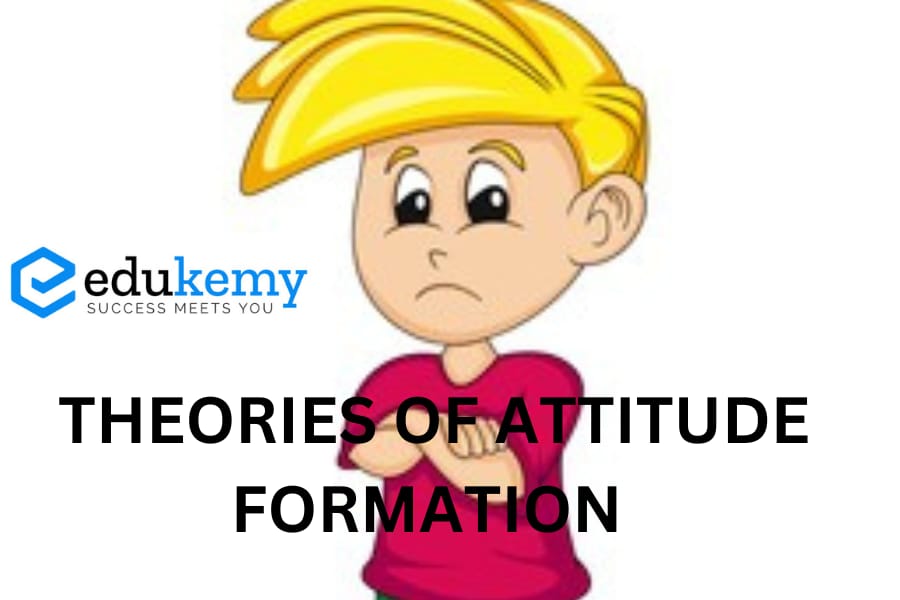
Attitudes play a pivotal role in shaping human behavior and decision-making processes. They encompass a spectrum of beliefs, feelings, and behaviors towards various objects, people, or ideas. Understanding how attitudes are formed is crucial for comprehending human psychology and social dynamics. Several theories attempt to elucidate the intricate process of attitude formation, shedding light on the factors that influence our perceptions and evaluations of the world around us. Let’s delve into some of these theories:
Contents
- 0.1 Cognitive Dissonance Theory:
- 0.2 Social Learning Theory:
- 0.3 Functional Theory of Attitudes:
- 0.4 The Elaboration Likelihood Model (ELM):
- 0.5 Balance Theory:
- 0.6 Direct experience:
- 0.7 Socialization:
- 0.8 Exposure to persuasive messages:
- 0.9 Classical conditioning:
- 0.10 Operant conditioning:
- 1 FAQs
Cognitive Dissonance Theory:
Proposed by Leon Festinger, this theory suggests that individuals strive for consistency in their beliefs and attitudes. When there’s a discrepancy between attitudes or between attitudes and behaviors, it leads to a state of cognitive dissonance, which motivates people to either change their attitudes or justify their behaviors.
Social Learning Theory:
This theory, popularized by Albert Bandura, emphasizes the role of observation and modeling in attitude formation. Individuals acquire attitudes by observing the behavior of others, especially influential figures or role models, and imitating their actions. Through this process, attitudes are learned and reinforced.
Functional Theory of Attitudes:
This theory posits that attitudes serve specific functions or purposes for individuals. Developed by Daniel Katz, this framework suggests that attitudes can be categorized based on their functions, such as instrumental (helping achieve goals), ego-defensive (protecting self-esteem), value-expressive (expressing values or beliefs), and knowledge (organizing and understanding the world).
The Elaboration Likelihood Model (ELM):
Developed by Richard E. Petty and John T. Cacioppo, the ELM delineates two routes to persuasion: the central route and the peripheral route. According to this model, attitudes are formed and changed through either systematic, thoughtful processing (central route) or superficial cues (peripheral route), depending on factors like motivation and ability to process information.
Balance Theory:
This theory, proposed by Fritz Heider, suggests that people strive for consistency in their attitudes and relationships. It posits that individuals perceive relationships among themselves, other people, and objects in a way that maintains consistency. When inconsistencies arise, they are motivated to restore balance by altering attitudes or relationships.
Here are some of the key processes of attitude formation:
Direct experience:
Attitudes can be formed through direct experience with an object, person, group, idea,
or event. For example, someone may develop a positive attitude towards a particular restaurant after
having a great meal there.
Socialization:
Attitudes can be learned through socialization, which refers to the process of acquiring norms, values, and beliefs from others in one’s social environment. For example, someone may develop a negative attitude towards a particular social group if their parents and peers hold negative views of that group.
Exposure to persuasive messages:
Attitudes can be influenced by exposure to persuasive messages from
various sources, such as advertising, media, and political campaigns. For example, someone may develop a more positive attitude towards a particular brand of soda after seeing a series of positive ads for that brand.
Classical conditioning:
Attitudes can be formed through classical conditioning, which refers to the process of associating a neutral stimulus with a positive or negative response. For example, someone may develop a positive attitude towards a particular song after hearing it played during a fun and enjoyable event.
Operant conditioning:
Attitudes can be formed through operant conditioning, which refers to the process of reinforcing behavior that is associated with a particular attitude. For example, someone may develop a positive attitude towards exercise after experiencing the benefits of regular exercises, such as improved health and mood.
FAQs
Q: How are attitudes formed?
Attitudes can be formed through various mechanisms such as direct experience, socialization processes, observational learning, and cognitive processes. Direct experiences, interactions with others, exposure to media, and cultural influences all contribute to the formation of attitudes.
Q: Can attitudes change over time?
Yes, attitudes are not static and can change over time due to various factors such as new information, experiences, persuasive communication, social influences, and personal reflection. The degree and speed of attitude change depend on factors like the strength of existing attitudes, the credibility of the source of change, and the relevance of the new information.
Q: What role do emotions play in attitude formation?
Emotions can significantly influence attitude formation by shaping our perceptions, evaluations, and responses to stimuli. Positive or negative emotional experiences associated with certain objects, people, or ideas can lead to the development or modification of attitudes. Emotionally charged events or persuasive messages can evoke strong emotional responses that impact attitude formation and change.
Q: Are there genetic factors influencing attitude formation?
While genetic predispositions can influence personality traits and certain aspects of behavior, attitudes are primarily shaped by environmental factors such as upbringing, socialization, cultural norms, and individual experiences. However, genetic factors may indirectly influence attitudes by affecting personality traits like openness to new experiences or susceptibility to certain emotions.
Q: Can attitudes predict behavior?
Attitudes are generally considered predictors of behavior, but the relationship between attitudes and behavior is complex and influenced by various factors such as situational constraints, social norms, and individual characteristics. Strong attitudes that are stable, relevant to the behavior, and held with conviction are more likely to predict behavior, especially when there are minimal conflicting influences or external pressures. However, attitudes alone may not always accurately predict behavior due to the presence of other intervening variables.
In case you still have your doubts, contact us on 9811333901.
For UPSC Prelims Resources, Click here
For Daily Updates and Study Material:
Join our Telegram Channel – Edukemy for IAS
- 1. Learn through Videos – here
- 2. Be Exam Ready by Practicing Daily MCQs – here
- 3. Daily Newsletter – Get all your Current Affairs Covered – here
- 4. Mains Answer Writing Practice – here

